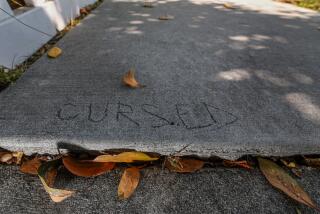Descendants File Suit Seeking Title to Railroad Right of Way in 2 Cities
For years, residents of Manhattan Beach and Hermosa Beach have sought to preserve the old railroad right of way that runs the length of the two towns.
But in their efforts to buy the land for open space, city officials have faced a troubling question: Who owns it?
Their doubts were validated this month when Manhattan Beach officials learned that they are being sued by 27 plaintiffs who claim they are the heirs to the right of way. The 27 filed the suit along with two independent title searchers in Torrance Superior Court, saying that the city and the Atchison, Topeka & Santa Fe Railway Co. have improperly claimed title to their land.
If the heirs win title to the land, they will challenge building restrictions on the 2.6-mile-long property, said their lawyer Joseph S. Dzida. “I don’t think (the cities) can restrict the property to open space,” Dzida said. “They, in effect, would be taking our property.”
Officials in both cities insist that the right of way will be maintained as a park, running path and parking lot, regardless of the court’s ruling on ownership.
The roots of the dispute reach deep into the history of the beach cities. The entrepreneurs who founded the pioneering Redondo Land Co. in the last century knew that their holdings would increase in value if they could bring a railroad to the area, said Jan Dennis, an amateur historian and Manhattan Beach councilwoman. The landowners granted an easement to the Redondo Beach Railway Co. in 1888 for a line that connected the harbor in Redondo Beach with Inglewood and parts beyond.
Deeds stated that the 100-foot-wide strip would revert to the original owners if it ever ceased to be used as a railroad, according to Dzida. An alteration later eliminated that clause, but Dzida said it still was clearly implied that the railway company could keep the land only for a railroad.
The Atchison, Topeka & Santa Fe Railway Co. acquired the tracks in the early part of this century and did not abandon the line until five years ago.
Benjamin Salvaty, the railroad’s lawyer, insisted that Santa Fe had title to the land until 1986, when it sold 2.1 miles of the right of way to the City of Manhattan Beach for cash, land and development rights worth at least $10 million.
Defend Against Challenges
The railroad agreed then to spend up to $5 million to defend the city against any title challenges, according to City Atty. Carl Newton.
But railroad and city officials disagreed this week over whether the railroad will have to defend the city against the lawsuit. Salvaty said the protection promised the city might not be valid because the city, in an unrelated dispute, withheld a portion of its payment for the right of way.
Newton said the railroad is bound by the agreement.
In the lawsuit, the heirs claim ownership of the entire right of way in Manhattan Beach and nearly a half-mile at the northernmost end of Hermosa Beach.
Dzida said 27 of those claiming the land are heirs of Redondo Land Co. founders or of early landowner George Peck. Only one, Betty Jane Mallery of Manhattan Beach, is a local resident. The rest live around the country and were unaware of the property until they were contacted last summer by John P. Farquhar and Ricardo B. Johnson.
Descendants of Pioneers
Farquhar, 75, and Johnson, 40, are descendants of California pioneers who have engaged for several years in title disputes with government agencies and utilities.
The pair began their work on behalf of their own families, most notably with a lawsuit they filed with more than 150 other heirs, claiming ownership of a 2.1-acre parcel of the Veteran’s Administration complex near Westwood. Farquhar, Johnson and the others said the land was granted for veterans. They sued after the federal government tried to sell the property as surplus in 1986 for at least $7.5 million. The case is set for trial in June.
Farquhar and Johnson said they learned last June about the railroad right of way.
“The original landowners who granted it to (the railroad) about 100 years ago are dead and maybe they didn’t tell their children or grandchildren that they had it,” Johnson said. “The railroad sold it (but) they didn’t own it.”
The two men said they tracked down 27 heirs of Peck and the Redondo Land Co. They said they promised to research and pay the cost of pursuing title, in exchange for a half interest in any property won in the dispute.
Heirs said in interviews that they were happy to let Farquhar and Johnson press their claim.
“In order for us to (pursue title) ourselves, we would have had to hire a retired title searcher,” said one of the plaintiffs, who asked not to be named. “We would have spent all this money. And who knows whether we would win or not?”
The lawsuit, which may not be resolved for years, clouds the future of the right of way.
The northernmost portion of the line, a 2.1-acre parcel between Rosecrans Avenue and Sepulveda Boulevard, had been designated for development by Santa Fe. But the railroad will not be permitted to build on the land, according to City Atty. Newton, until the city has undisputed title to the rest of the right of way.
If the heirs win their lawsuit, Manhattan Beach’s purchase of the right of way would be invalidated, Dzida said. The city would then have to negotiate with the heirs in order to purchase the 2.1-mile, 21-acre strip, which stretches from Sepulveda just south of Rosecrans to the city’s southern border.
Negotiating for 6 Months
If the heirs win the title challenge and then overturn the open-space zoning, the property could be much more expensive for the city. But Newton predicted that the open-space designation cannot be successfully challenged because the city published all the required legal notices when it zoned the property in 1986 and the heirs did not challenge the action then.
In Hermosa Beach, city officials have been negotiating with Santa Fe for six months to purchase the right of way in their city. The heirs claim that they are rightful owners of the nearly half-mile section of the property between the Manhattan Beach city line and Porter Lane.
The lawsuit will “cloud” but not cripple the city’s attempts to buy that section of the right of way, according to Hermosa Beach City Atty. James Lough.
Lough said the city will continue to negotiate with Santa Fe for the land, and might request indemnification similar to Manhattan Beach’s to protect it from conflicting title claims.
More to Read
Sign up for Essential California
The most important California stories and recommendations in your inbox every morning.
You may occasionally receive promotional content from the Los Angeles Times.











